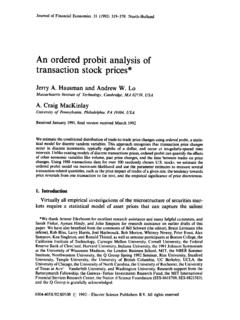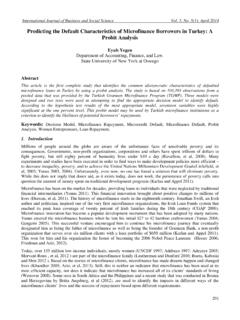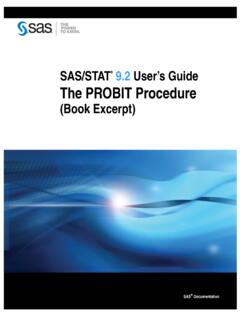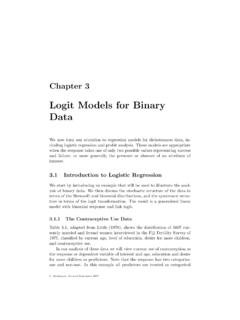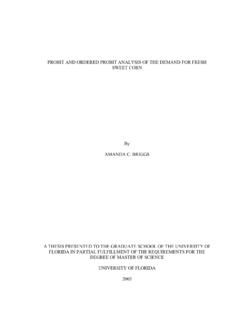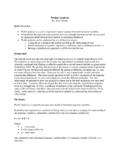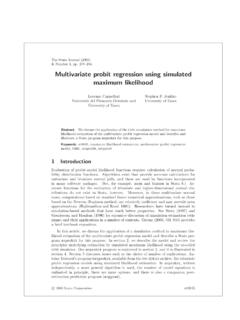Transcription of PROBIT MODEL ANALYSIS OF SMALLHOLDER S FARMERS …
1 International Journal of Food and Agricultural Economics ISSN 2147-8988 Vol. 2 No. 1 pp. 85-93 85 PROBIT MODEL ANALYSIS OF SMALLHOLDER S FARMERS DECISION TO USE AGROCHEMICAL INPUTS IN GWAGWALADA AND KUJE AREA COUNCILS OF FEDERAL CAPITAL TERRITORY, ABUJA, NIGERIA Omotayo Olugbenga Alabi Department of Agricultural-Economics and Extension, Faculty of Agriculture, University of Abuja, 117 Gwagwalada-Abuja, Federal Capital Territory, Abuja, Nigeria. E-mail: Tel:+2348023582181. Alimi Folorunsho Lawal Department of Agricultural-Economics and Extension Services, Faculty of Agriculture, Ibrahim Badamasi Babangida University (IBBU), Lapai, 11, Lapai, Niger State, Nigeria Ayodeji Alexander Coker Department of Agricultural-Economics and Extension Technology, School of Agriculture and Agricultural Technology (SAAT)
2 , Federal University of Technology Minna, 65 Minna, Niger State, Nigeria Yisau Akanfe Awoyinka International Cooperation Department, National Planning Commission, Abuja, Nigeria Abstract This study examined PROBIT MODEL ANALYSIS of SMALLHOLDER s FARMERS decision to use agrochemical inputs in Gwagwalada and Kuje Area Councils of Federal Capital Territory, Abuja, Nigeria. Primary data were used for this study. Data were obtained using structured questionnaire. The questionnaires were administered to sixty SMALLHOLDER s FARMERS sampled using a two-stage sampling technique. Data obtained were analyzed using descriptive statistics and PROBIT MODEL .
3 Eight estimators, age; farm-size; education level; extension services; access to credit; off-farm income; experiences in farming; in the PROBIT MODEL were found statistically significant. Results show that the probability of using agrochemical inputs increases with age; farm-size; family-size; education-level; extension services; experiences in farming but decreases where they have off-farm income and access to credits. Mc Fadden Pseudo-R2 gives and PROBIT MODEL correctly classified 93%. This study concluded that capacity of agricultural extension agents needs to be improved in the study area to educate FARMERS to invest in agrochemicals and improved agricultural technologies.
4 Also, Government needs to improve on good road networks and appropriate policies to regulate standard, use, safety needs and environment of use of agrochemicals in the study area. Keywords: Agrochemicals, smallholders FARMERS , PROBIT MODEL , Abuja, Nigeria. PROBIT MODEL ANALYSIS of SMALLHOLDER s 86 1. Introduction Agrochemical a contraction of agricultural chemical is a generic term for the various chemical products used in agriculture. In most cases, agrochemical refers to the broad range of pesticide including insecticides, herbicides, and fungicides. It may also include synthetic fertilizers, hormones and other chemical growth agents and concentrated stores of raw animal manure (Larry, 2012).
5 Most agrochemicals are toxic and can pose danger to human health (WHO, 2008); hence, their use is highly regulated internationally, nationally and regionally with regulations and conventions (PAR, 2000; FAO/WHO, 2001). The cultivation of crops is accompanied by the application of agrochemicals. FARMERS are increasingly relying on inorganic agriculture mainly because the soils are poor, and indigenous crop varieties have almost been replaced by improved high yielding varieties which are heavy nutrient miners. Most of the crops cultivated are short duration crops, the crops are also quite susceptible to many insect species, which may not only feed but also reproduce on them.
6 So the farmer seems to have no choice but to treat crops and protect them against insect species and diseases using agrochemicals (Larry, 2012). Agrochemicals are crop protection products or agents used to control plants or weeds, diseases, insects or animals that are undesirable or harmful to man, and or also to promote the growth and development of crops. Local FARMERS in developing countries have little or no knowledge on how, what, when and how often to apply agrochemicals on their crops; the consequence of which is the destruction of entire crops fields, polluting water bodies and putting human health and environment at risk ( Machipisa, 1996; Ntow, 2004; IUPAC, 2008 ).
7 Incidentally, many FARMERS who use these agrochemicals do not know much about the dangers associated with them and hence end up tasting to determine their potency and also failing to protect themselves during their formulation and application. As a result of continuous application of agrochemicals, the fertility status of farm lands is getting worse year after year; many insects and their predators are destroyed and others have evolved resistant strains (Tanzubil, 1997). It is also worth noting that, despite the incessant use of agrochemical products by FARMERS , 20 40 % of potential food production is still lost every year to pests and diseases (Obeng-Ofori, 1998).
8 From an agricultural industry perspective, pesticides are an important component of economic and effective pest control and their continued use is essential (Kent, 1991). Pesticides are widely used in agricultural production to protect crops and animals from pest including insects, mites, birds, ticks, nematodes, weeds, fungus, and other organisms that causes losses and maintain high product quality. Some pesticides are prepared locally by FARMERS (natural pesticides neem extract, wood ash) while others manufactured in industries through advanced procedures (synthetic or artificial pesticides). The FAO and WHO statement said that the problem of poor quality pesticides is particularly widespread in sub- Saharan Africa, where quality control is weak.
9 SMALLHOLDER FARMERS is used more generally to describe rural producers predominantly in developing countries, who farm using mainly family labour and for whom the farm provides the principal sources of income (Ellis, 1998). FAO study defines smallholders as FARMERS with limited resources endowments relatives to other FARMERS in the sectors (Dixon et al, 2003). The World Bank s rural development strategy defines smallholders as those with a low asset base, operating less than 2 hectares of crop land (World Bank, 2003). This study intends to provide answers to the following research questions: What are the socio- economic characteristics of sampled SMALLHOLDER s FARMERS in the study area?
10 What are the factors influencing SMALLHOLDER s FARMERS decision to use agrochemical inputs in the study area? O. O. Alabi, A. F. Lawal, A. A. Coker and Y. A. Awoyinka 87 This study seeks to provide answers to the following specific objectives: identify the socio-economic characteristics of sampled SMALLHOLDER s FARMERS in the study area. evaluate factors influencing SMALLHOLDER s FARMERS decision to use agrochemical inputs in the study area. 2. Methodology The Study Area The study was conducted in Gwagwalada and Kuje Area Councils of Federal Capital Territory, Abuja, Nigeria. Federal Capital Territory is located within Latitudes 700 20 North of Equator and Longitudes 600 45 and 700 39.

